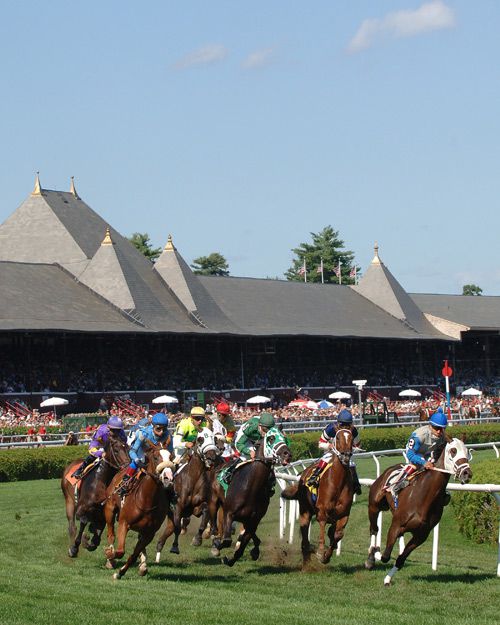In most races AT A RESPECTIVE TRACK, the answer is, not that important. In most races, the horse is about 90% of the winning formula if the horse gets a reasonably competent ride. If you gave me a Ferrari and Dale Earnhardt a Hyundai Elantra I’m pretty sure I’m winning that battle. My certainty comes from the fact that people who drive with me often ask if I think I am at Daytona. Well that and the fact a Ferrari is just way faster than an Elantra. But Earnhardt might finish closer than my next door neighbor.
The jockey helps a horse to win in the following ways:
- They break a horse in a way that allows the horse to establish the proper position.
- They steer the horse clear of trouble.
- They keep the horse on the live part of the racetrack.
- They make sure their horse will have a clear lane to run in.
- They understand energy distribution for a particular animal.
- They understand quirky trips (like 6 1/2F downhill at SA)at certain tracks.
- They move the horse at the right time.
- They relax the horse at the right time.
- They get the horse to change leads at the right time.
- They keep the horse running in a straight line.
When they do these things they give the horse the best chance to win, and yes, better jockeys do it better than poorer jockeys. But don’t believe that putting Javier Castellano on a 1 for 27 horse in a NW2 race is suddenly going to change the horse from also ran to winner. If you like a horse and one of the top 10 or so riders is in the saddle, you’re fine.
For anyone considering jockey as a career, I am giving you the absolute secret of success. Ready?
GET THE BEST HORSES.
In my experience, and this is anecdotal, for every time I get a brilliant ride, I get about five bonehead rides and 25 my-horse-did/didn’t-have-it-today rides where the jockey was irrelevant.
Yes, if you lose a race with what you think is the best horse it is not unusual to give the jockey some of the blame. I had a race at Belmont last Sunday where a jockey who has actually won a Breeder’s Cup race, broke the horse I bet on sharply, and instead of playing to his presser running style, strangled him back to last and made a big sustained close in the stretch to finish second. You’ll never convince me I got the right ride.
Jockey’s lose races with poor rides far more often than they win races with brilliant rides, but about 90% of the time the win/loss has less to do with the jockey than the horse.
I’m not dogging jockeys. They have a job with a danger quotient about the same as great white shark biologists. In fact, I’ll say that if most of us got treated at work as shabbily as jockeys, unions would make a comeback like it was 1914 instead of 2014. That doesn’t change my opinion about handicapping a race. Most riders at your respective race meet are competent within their peer group, and if you give them the right horse they have a chance to win.
When a jockey makes it on a particular circuit, it is definitely related to hard work and staying in great condition. But at the risk of repeating myself, the difference between the top jockey at a meet and the 10th best on the standings is more a matter of the horses they are getting. Johnny Velasquez is a great rider, but it didn’t hurt that he was getting all of Todd Pletcher’s horses. Travis Wales, the leading rider at Arapahoe Park, is probably never going to ride in the Kentucky Derby, but not because he would have turned California Chrome into an also ran. And if he went to New York to ride, he’d be lucky to get a mount.
THE BEST JOCKEYS GET THE BEST HORSES, AND THE BEST HORSES GET THE BEST JOCKEYS.
Here are some other questions I get asked.
Are some jockeys better on the dirt? Yes, they are called the leading riders at the track.
Are some jockeys better on the turf? Yes, they are called the leading riders at the track.
And that is pretty much the answer to all your questions.
